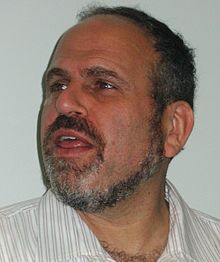- Matthew Rabin
-
Matthew Joel Rabin (* 27. Dezember 1963) ist ein US-amerikanischer Wirtschaftswissenschaftler. Er forscht und lehrt als Professor für Wirtschaftswissenschaften an der University of California, Berkeley.
Inhaltsverzeichnis
Leben und Wirken
Rabin studierte von 1981 bis 1984 an der University of Wisconsin-Madison, wo er im Dezember 1984 seinen B.A. in Wirtschaftswissenschaften und Mathematik erhielt. 1985 setzte er seine Studien an der London School of Economics fort, ehe er noch im gleichen Jahr ans Massachusetts Institute of Technology (MIT) wechselte, das er 1989 mit dem Ph.D. in Ökonomie verließ. Seine Doktorarbeit Predictions and solution concepts in non-cooperative games hatte er unter der Betreuung von Drew Fudenberg angefertigt. Anschließend war er bis 1996 Assistenzprofessor und von 1996 bis 1999 außerordentlicher Professor an der University of California, Berkeley. Seit 1999 ist er dort ordentlicher Professor. Gastprofessuren führten ihn ans MIT (1993–1994), an die Northwestern University (1997), an die London School of Economics (2000–2001), und an die Harvard University (2004).
Das einfache Modell des Homo oeconomicus, der sich durch eigeninteressiertes und rationales Verhalten auszeichnet, hat Probleme bei der Erklärung des Gefangenendilemmas, des Feiglingsspiels oder des Ultimatumspiels. Diese Probleme konnte Rabin lösen, indem er Anfang der 1990er Jahre Fairness in das Modell einbrachte.[1] Dazu führte er eine Freundlichkeitsfunktion ein, die beschreibt, ob ein Spieler sich nett oder gemein zu seinen Mitspielern verhält. Außerdem untersuchte er, wie sich die Möglichkeit zur Kommunikation zwischen den Beteiligten auf Spiele auswirkt.[2] Später widmete sich Rabin fast vollständig der Verhaltensökonomik. Er untersuchte wie Vorurteile erhalten bleiben[3], außerdem Risikoaversion[4], Aufschieben und Selbstkontrolle[5] sowie Moral.[6]
Werke
- Predictions and solution concepts in non-cooperative games. Dissertation, Massachusetts Institute of Technology, 1989
- Colin F. Camerer, George Loewenstein und Matthew Rabin (Hrsg.): Advances in Behavioral Economics. Russell Sage Foundation, New York 2004; Princeton University Press, Princeton 2004, ISBN 0691116822
- mit Georg Weizsäcker: Narrow Bracketing and Dominated Choices (= Discussion Paper No. 3040). IZA, Bonn 2007 (pdf, 668 kB)
Auszeichnungen
- 2000 MacArthur Fellow
- 2001 John Bates Clark Medal (American Economic Association)
- 2006 John von Neumann Award
- 2011 Ehrendoktor der Universität Zürich[7]
Mitgliedschaften
Literatur
- Colin Camerer und Richard H. Thaler: In Honor of Matthew Rabin: Winner of the John Bates Clark Medal. In: Journal of Economic Perspectives. Band 17, Nr. 3, 2003, S. 159–176 (mit Bild, online)
Weblinks
- Rabin, Matthew auf der Seite der University of California, Berkeley
Einzelnachweise
- ↑ Incorporating Fairness into Game Theory and Economics. In: American Economic Review. Band 83, Dezember 1993, S. 1281–1302.
- ↑ A Model of Pre-Game Communication. In: Journal of Economic Theory. Band 63, August 1994, S. 370–391, doi:10.1006/jeth.1994.1047; mit Joel Sobel: Deviations, Dynamics, and Equilibrium Refinements. In: Journal of Economic Theory. Band 68, Nr. 1, Januar 1996, S. 1–25, doi:10.1006/jeth.1996.0001; mit Joseph Farrell: Cheap Talk. In: Journal of Economic Perspectives. Band 10, Nr. 3, Sommer 1996, S. 103–118.
- ↑ mit Joel Schrag: First Impressions Matter. A Model of Confirmatory Bias. In: Quarterly Journal of Economics. Band 114, Nr. 1, Februar 1999, S. 37–82.
- ↑ mit Daniel Read und George Loewenstein: Choice Bracketing. In: Journal of Risk and Uncertainty. Band 19, Nr. 1–3, Dezember 1999, S. 171–197; Risk Aversion and Expected-Utility Theory. A Calibration Theorem. In: Econometrica. Band 68, Nr. 5, September 2000, S. 1281–1292; mit Richard Thaler: Risk Aversion. In: Journal of Economic Perspectives. Band 15, Nr. 1, Winter 2001, S. 219 –232.
- ↑ mit Ted O’Donoghue: Doing It Now or Later. In: American Economic Review. Band 89, Nr. 1, März 1999, S. 103–124; mit Ted O’Donoghue: Choice and Procrastination. In: Quarterly Journal of Economics. Februar 2001, S. 121–160.
- ↑ Cognitive Dissonance and Social Change. In: Journal of Economic Behavior and Organization. Band 23, 1994, S. 177–194; Moral Preferences, Moral Constraints, and Self-Serving Biases. Berkeley Department of Economics Working Paper No. 95–241, August 1995.
- ↑ http://www.nzz.ch/nachrichten/zuerich/stadt_und_region/tierschuetzerin_und_aufklaerer_1.10444940.html Neue Zürcher Zeitung, 2. Mai 2011 (abgerufen am 2. Mai 2011)
Kategorien:- Ökonom (20. Jahrhundert)
- Ökonom (21. Jahrhundert)
- Hochschullehrer (Berkeley, Kalifornien)
- US-Amerikaner
- Geboren 1963
- Mann
Wikimedia Foundation.

